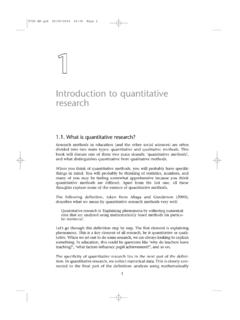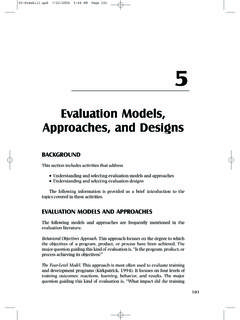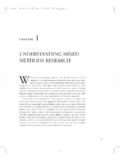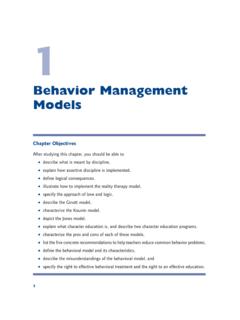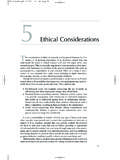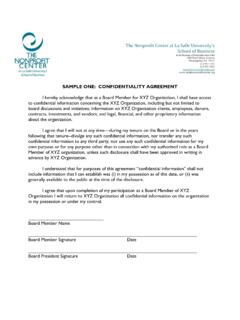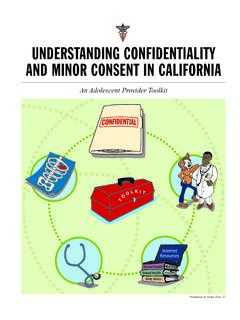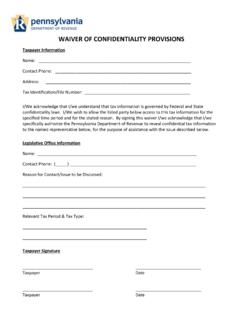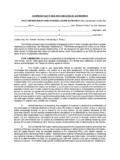Transcription of Confidentiality & Record Keeping in Counselling ...
1 Confidentiality & Record Keeping in Counselling & PsychotherapySecond EditionTim Bond and Barbara 317-Jun-14 5:45:56 PM1 Recording ConfidencesI am a reasonably good therapist with many years experience. My clients are well satisfied with what I offer .. but I do feel nervous about whether what I do concerning Confidentiality is legally provide Counselling in two places. My employer s policy on Confidentiality is so differ-ent from what I do in my private practice that I cannot see how they can both be know what I am doing when I am Counselling or coaching .. I feel confident about when I need to get extra support. When the law is mentioned I feel exactly the opposite. The law seems so big and I feel so small in comparison that I feel uncertain, anxious and watch myself becoming make things simple, I have decided to treat everything my clients tell me as absolutely confidential. It s worked so far but I know that one day it may get me into trouble.
2 I have had a few awkward moments and think that I ought to get clearer about what the law don t keep any records am I wrong?I usually keep client records. One client says she won t work with me if I keep records can I agree to this or should I refuse to work with her?When we ask therapists how they approach Confidentiality and Record keep-ing in their practice, these are some of the typical comments we receive. We understand therapists concern about making and Keeping boundaries in con-fidentiality and records and it seems to us that few issues raise greater anxiety for counsellors and psychotherapists than the appropriate management of their clients confidences, particularly where a client s trust is at good practice concerning Confidentiality and Record Keeping can strengthen the therapeutic relationship as trust is deepened and clients feel increasingly secure and respected. This is critically important in Counselling and psychotherapy, where clients need to feel able to discuss sensitive thoughts and issues without worrying that their confidences might be communicated to others in ways that could harm the client by damaging their reputation or upsetting others.
3 Therapy is usually possible only where there is a high degree of respect for clients confidences and the other hand, badly managed Confidentiality and Record Keeping can have the completely opposite effect, destroying ways of working together and leaving 02_Bond_Mitchels_2E_BAB1406B0096_Ch-01_P art 56/17/2014 2:20:42 PM6 Part I Confidentiality and the lawthe client feeling betrayed, hurt and misunderstood and the therapist s reputation or integrity undermined. It is therefore not surprising that Confidentiality is one of the issues most frequently raised by therapists. This indicates both its importance to everyday practice and the level of difficulty involved in managing it an issue of such importance to therapists and their clients, it is both rea-sonable and professionally responsible to turn first to the law for guidance. For many therapists, this is where the problems begin. Those who hope for clear and unequivocal guidance leading to certainty will be disappointed in most legal systems based on English and Scottish law or other legal systems closely related.
4 Instead of precise rules that can be automatically applied, the law operates as a framework in which professionals, including therapists, are required to exercise a degree of judgement in how they apply the law to the specific circumstances of their work. It is also an area of law where therapists may receive contradictory advice from different sources. Our aim in writing this book is to provide informa-tion for therapists so that they can base their judgement on a reasonable degree of knowledge about the essential points of law involved, spot the hidden traps , and develop an understanding of some of the complexities and points of tension in the existing and Record Keeping have been combined in a single book because the two issues are often experienced as increasingly linked and existing in tension with each other. One therapist memorably likened recording her clients confidence to walking a tightrope .. wearing a blindfold.
5 She worked in a service for young people and their parents which had seen a steadily increasing number of requests for copies of clients records from lawyers for use as evidence in court cases and growing pressures on therapists to co-operate more closely with other profession-als. As she reflected on these pressures in her work, she observed:I feel that I am walking a tightrope. So long as I stay on the rope I am OK but Keeping my balance can be difficult. If I wobble too much towards either side I will fall off. If I lean too far in one direction, by Keeping the briefest possible records to protect my client s confidences, I reduce my competence to help my client because my records become too skimpy to help me deliver the therapy. If I lean too far towards on the other side by Keeping over-detailed records, I may compromise my client s privacy when I am required to reveal those records. It feels like a balancing act. Sometimes I feel that I am walk-ing the tightrope wearing a blindfold because I cannot always identify what is legally expected of this book, we hope to be able to remove the blindfold by adequately explaining the relevant law.
6 We set out the legal frameworks that apply to Confidentiality and Record Keeping in order to help therapists develop and review their practice in ways that are compatible with the law. Because the law needs to be flexible and so cannot always provide absolute certainty, and because client and therapist circumstances vary widely, we may not be able to eliminate the difficulty of balancing competing legal responsibilities and conflicting legal opinions. We intend that well-informed 02_Bond_Mitchels_2E_BAB1406B0096_Ch-01_P art 66/17/2014 2:20:42 PMRecording confidences 7therapists will be able to use the law to support their work and to resist unjustified intrusions into their clients Confidentiality and privacy. Knowledge of the law is no substitute for being a competent therapist. However, competent therapists who are knowledgeable about the law are best placed to establish some of the essential conditions from which to deliver the highest quality Using this bookThroughout the book we include extracts and quotations at the start of chapters from comments made to us by therapists, clients and service managers.
7 These illustrate a wide range of views on Confidentiality and Record Keeping , and they have influenced the way we present the legal information and analysis which we have designed to be easily applied by therapists. We have deliberately avoided the traditional style of legal textbooks written for lawyers, but will include refer-ences to them where they provide useful sources of further information. We are particularly interested in understanding how the law works in the context of therapy practice. It is seldom more complex than when therapists are working in large organisations with multiple responsibilities to their service users and the community as a have developed the structure of the second edition of this book for busy therapists. Some may read the book from cover to cover, but we imagine that most will pick topics of particular relevance to whatever issue is causing concern or is of interest. To meet most needs, we have attempted to ensure that each chapter is complete in itself, even if this sometimes means some repetition between chap-ters or including cross-references to other sources in the book.
8 The best way of navigating around the book will be to use the Contents page or Index. There are inevitably technical terms in any area of law. We have attempted to keep these to a minimum and have provided a glossary to briefly explain the important have included in this new edition a range of short practice scenarios for reflection and discussion, and checklists to help practitioners think through issues and dilemmas and for discussion in supervision. We hope that these may prove useful to understand and implement the law, ethics and guidance in the context of The importance of obtaining legal adviceBreaches of confidence and poor Record Keeping may incur legal liabilities or penalties. There is no substitute for obtaining good up-to-date legal advice on any issues that are of importance to you or your service. The law is constantly developing and legal opinion frequently depends on the precise circumstances of a particular case.
9 Many professional bodies and insurance services provide access to legal advice or can guide you on where to find the best available legal book should not be used as substitute for obtaining advice from a lawyer who is qualified and experienced in the relevant field. The bookis intended to 02_Bond_Mitchels_2E_BAB1406B0096_Ch-01_P art 76/17/2014 2:20:42 PM8 Part I Confidentiality and the lawhelp readers understand the broader legal issues concerning Confidentiality and Record Keeping . It may also help managers, practitioners and clients to recognise when there are significant issues at stake that require specific legal advice or to understand the advice that has been given to Defining key termsThere are many technical terms used in the law concerning professional confi-dentiality and Record Keeping . We have provided explanations of these terms in the Glossary at the end of the book, but three terms are so fundamental to understanding this topic that they merit consideration here.
10 These key terms are Confidentiality , privacy and records . Each of these terms takes on technical meanings in law that differ from their use in everyday life or their routine practice by counsellors and psychotherapists. In this section, we consider their legal mean-ing and ConfidentialityTo confide in someone is to put your trust in that person. The word s origin lies in Latin, with con acting as an intensifier of fidere, meaning to trust or put one s faith in, and is probably best translated as to strongly trust someone . Confidentiality presupposes trust between two people in a community of at least three people. For example, Confidentiality occurs when two people decide to restrict the communi-cation of information, Keeping it between themselves in order to prevent it being communicated to a third person or to more people. In a professional relationship, Confidentiality means protecting information that could only be disclosed at some cost to another s privacy in order to protect that privacy from being compro-mised any further.


